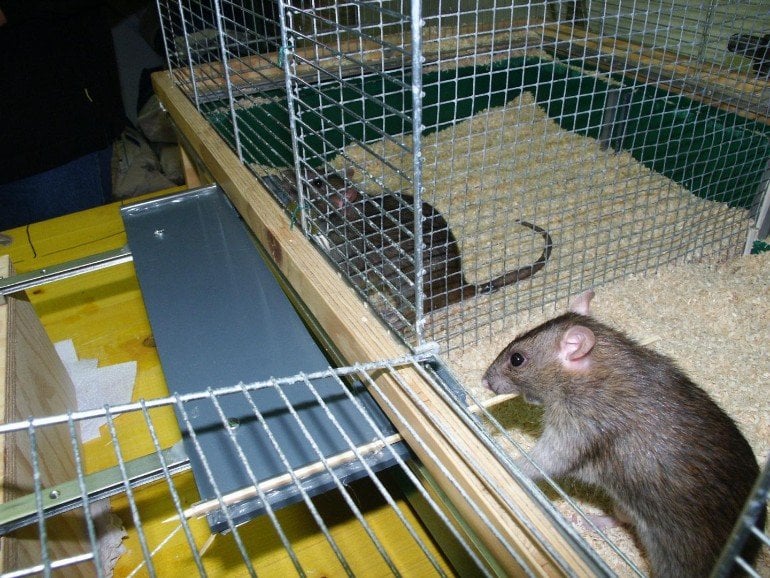Summary: The smell of a cooperative rat is enough to trigger altruistic responses in other rodents.
Source: University of Göttingen
Despite their reputation, rats are surprisingly sociable and actually regularly help each other out with tasks. Researchers at the Universities of Göttingen, Bern and St Andrews have now shown that a rat just has to smell the scent of another rat that is engaged in helpful behaviour to increase his or her own helpfulness. This is the first study to show that just the smell of a cooperating individual rat is enough to trigger an altruistic and helpful response in another.
The research was published in the Proceedings of the Royal Society B.
It is well known that rats will help each other out. What the researchers wanted to know was whether the rat’s odour during this behaviour had any effect on another rat’s helpfulness. They therefore carried out a series of tests to study the importance of the scent of a rat while making cooperative decisions.
The rats being studied could choose to help another rat by pulling a platform containing a reward towards the other rat’s cage. This provided food for the other rat but did not have any immediate benefit for them personally.
The researchers then provided the test rats either with the smell of a rat that was being helpful to another rat in a different room or with the smell of a rat that was not engaged in helpful behaviour. The researchers were surprised to find that just the scent of a rat engaged in helpful behavior was enough to illicit helpful behaviour in the other.
Dr Nina Gerber from the Wildlife Sciences at the University of Göttingen, who led the research, says: “Test rats increased their own helping behaviour when they were presented with the smell of a helpful rat. Remarkably, this holds true even though they did not experience this helpful behaviour themselves.”

She goes on to say, “Furthermore, such a ‘smell of cooperation’ depends on the actual activity of helping and is not connected to an individual rat. There isn’t a “special smell” for certain nice rats: the same individual can release the scent of being helpful or not, depending solely on their behaviour.”
The researchers concluded that physical cues – such as smell – might be even more important for rats to encourage cooperation than actual experiences. Gerber adds, “Even though people do not seem to rely on communication through scent in the way rats do, some studies indicate that scent is key for finding partners, or that smelling certain chemicals can increase trust in others. Whether there is such a ‘smell of cooperation’ in humans, however, would be an interesting question for future studies.”
About this neuroscience research news
Source: University of Göttingen
Contact: Melissa Sollich – University of Göttingen
Image: The image is credited to Michael Taborsky
Original Research: Closed access.
“The smell of cooperation: rats increase helpful behaviour when receiving odour cues of a conspecific performing a cooperative task” by Gerber N et al. Proceedings of the Royal Society B
Abstract
The smell of cooperation: rats increase helpful behaviour when receiving odour cues of a conspecific performing a cooperative task
Reciprocity can explain cooperative behaviour among non-kin, where individuals help others depending on their experience in previous interactions. Norway rats (Rattus norvegicus) cooperate reciprocally according to direct and generalized reciprocity. In a sequence of four consecutive experiments, we show that odour cues from a cooperating conspecific are sufficient to induce the altruistic help of rats in a food-exchange task. When rats were enabled to help a non-cooperative partner while receiving olfactory information from a rat helping a conspecific in a different room, they helped their non-cooperative partner as if it was a cooperative one. We further show that the cues inducing altruistic behaviour are released during the act of cooperation and do not depend on the identity of the cue provider. Remarkably, olfactory cues seem to be more important for cooperation decisions than experiencing a cooperative act per se. This suggests that rats may signal their cooperation propensity to social partners, which increases their chances to receive help in return.






